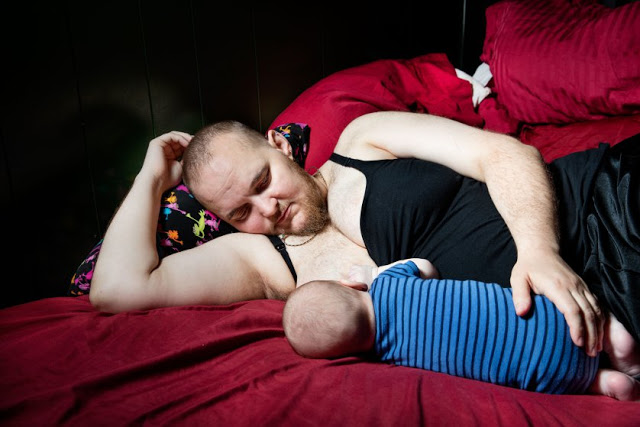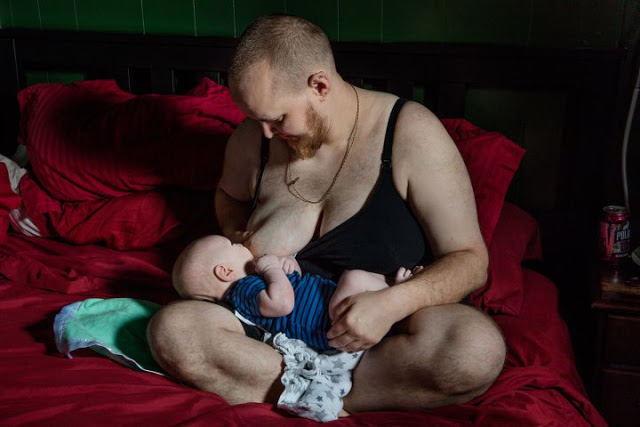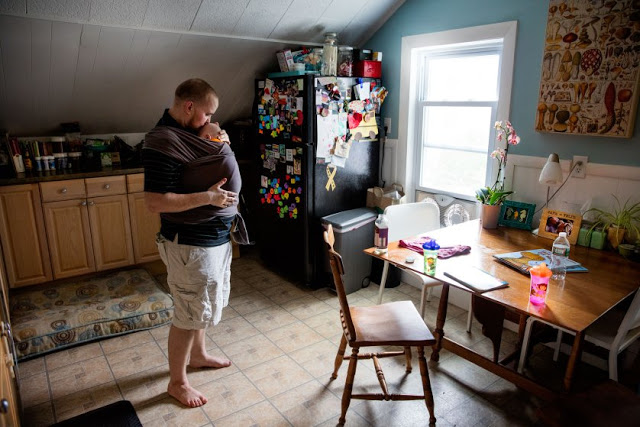by Jessi Hempel
Writing for the Time, Jessi Hempel narrates the incredible journey of her brother’s first pregnancy:
My brother Evan was born female. He came out as transgender 16 years ago but never stopped wanting to have a baby. This spring he gave birth to his first child.
When the call came, my brother was at work in the open office in Cambridge, Mass., he shares with seven colleagues who, like him, help run clinical trials for a drug developer.
The phone number came up blocked, so he knew it must be the doctor. He stood up, unsteady on his feet.
Was he a little nauseous? Or was that just adrenaline? He ducked into the hallway in search of quiet.
My brother Evan, 35, is a stocky guy of medium height with a trimmed, fuzzy blond beard and two gem studs in each earlobe.
He usually wears a Red Sox hat, and when he’s nervous, he’ll remove it and obsessively bend the rim. But on that September afternoon, both of his hands were clutching his phone, the right one cupping the left for privacy. “Hello?”
“This is Dr. Kowalik,” said the voice.
The identification was unnecessary. Ania Kowalik is a reproductive endocrinologist at a clinic called Fertility Solutions in Dedham, Mass.
They’d spoken regularly for more than six months.
Evan, who was born female, had wanted to be a parent since he was very young, when he played with dolls just a bit longer than the other kids. He’d helped pay for college by nannying triplets.
And when he first came out to friends as transgender at 19, changing his name and beginning his long physical transformation, he didn’t stop adding to the list of baby names in the back of his journal: Kaya, Eleanor, Huxley.
Evan knew he should feel excited. But instead, he felt a chill of anxiety and anticipation. He’d wanted this for so long, he later told me, and had been close to getting it.
Then, four months earlier, he’d miscarried after Kowalik told him she couldn’t find a heartbeat during his first ultrasound.
She was brief: Evan was pregnant. Kowalik told him he had low levels of progesterone, a hormone that helps maintain a healthy pregnancy, and prescribed some pills for him to start taking right away.
Evan isn’t sure how long he stood in the hallway after the call. People from other offices brushed by him, caught up in their work.
He called his partner, and her gasp was loud enough that Evan held the phone away from his ear momentarily.
He pulled up a calculator to figure out his due date.
I am six years older than Evan. We also have a middle sister, Katje.
As a trio, we’ve always resembled one another, but Evan and I were the most alike. We still have the same patterns of speech and the same slight roll to our shoulders that we inherited from our grandmother on our dad’s side.
Once, when Evan was in college at Oberlin and I was in grad school at the University of California, Berkeley, he flew across the country to visit me.
When he got off the plane, we were both wearing the same thing: puffy down vests over long-sleeved ultimate-frisbee T-shirts and baseball caps worn backward.

By then, my brother had already come out to himself and friends as trans, but he didn’t tell me until 2003, when he started taking hormones.
He called me to say that when he came for my graduation, I should call him Evan.
Over the next few months, I watched his body change. He started binding his chest with a thick bandage wrap. His hair began to thin.
His hips disappeared and were replaced by thick muscles around his chest.
But mostly, I remember his hands. We both have the same small hands, the same indelicate, stubby fingers.
I watched the hair grow thick over his knuckles, which were my knuckles. I felt sad that, feature by feature, I was losing my doppelgänger.
The transition was messy.
Our parents were supportive but distracted. They were in a protracted divorce after my father had, at 50, come out as gay.
Katje and I dated women, and I would kid Evan that being gay wasn’t rebellious enough in our family; he had to do us one better and change gender.
Looking back, I regret these jokes. They were a crass way to cover the pain of knowing that the childhood we all shared–the one in which we were three round-faced, pigtailed girls in matching dresses–had been a charade for my brother.
I said the wrong things all the time. That first year Evan looked strange to me, like a butch lady or a girly man.
He went through a sped-up version of puberty that brought changes to his voice and testosterone-fueled impulses he didn’t understand.
I often used ‘she’ to address him by accident. I’d forget and call him by his given female name, or refer to him as her. And in an attempt to sound interested and supportive, I asked him invasive and personal questions, often in mixed company.
Once, during a brunch with our extended family, I asked him about whether he planned to alter his genitals.
“Jessi,” he said, raising his right eyebrow in that way we both do. “I don’t talk about your vagina in front of Aunt Rosie.”
Thirteen years later, no one mistakenly uses ‘she’ to address my brother.
Physically, he is transformed. He’s 5 ft. 6 in., just tall enough that he makes a respectable short guy. Before his pregnancy, he injected hormones into his thigh once weekly to lower his estrogen while boosting his testosterone.
He elected not to have top surgery, the double mastectomy that many trans men undergo, because he is allergic to most antibiotics.
Also, he knew he might one day want to nurse a baby. So he wears two compression-tank binds made by a company called Underworks beneath his shirt.
“It hurts, but I’ve gotten used to it,” he told me. “I imagine it’s like some women getting used to high heels.”
His transformation is as much social as it is physical. It’s not just that Evan looks like a guy.
For nearly a dozen years, the world has responded to him as a guy.
At first, particularly when he was with other men who didn’t know he was trans, this made him nervous–like he would somehow say the wrong thing and out himself.
But now he’s comfortable. To medical professionals, he’s a trans guy, but to the rest of the world and to himself, he’s just a guy.
There is very little research about trans pregnancies. One of the only medical papers addressing the topic was written in 2015 by the University of California, San Francisco’s Dr. Juno Obedin-Maliver and Harvard Medical School’s Dr. Harvey Makadon.
They noted that, in form and function, getting pregnant as a trans man is not that different than getting pregnant as a woman.
Most of the time, trans men stop taking testosterone, and their bodies begin ovulating again. (Testosterone doesn’t necessarily preclude a pregnancy. Some trans men may have unintentional pregnancies while taking it.)
If their partner is biologically male, trans men may try to conceive without medical intervention.
My brother has a female partner, so he inseminated using donor sperm. It took a while. The first time Evan tried, five years ago, he was unsuccessful.
He took a break before starting again three years ago. He stopped his T shots, Kowalik prescribed two medications to trigger ovulation and monitored Evan’s body throughout the process to get the timing right.
Evan estimates that the entire process, including medication, doctor visits, co-pays and ultrasounds, cost him close to $12,000 over the course of several years.
That’s expensive, but it can cost much more.
If home insemination doesn’t work, trans men may turn to other fertility treatments, like in vitro fertilization.
Each round of IVF costs an average of $12,400, and often, by that point, aspiring parents have already invested a considerable sum in earlier, unsuccessful methods.
***
During my brother’s first trimester, he only wanted to eat Fla-Vor-Ice pops, Sour Patch Kids and hard-boiled eggs. He threw up constantly.
Normally, Evan worked until 7 each day, came home for dinner and then answered a few more emails before bed. But once he was pregnant, his body stopped cooperating. At 8:30 p.m., no matter where he was, he fell asleep.
By November, he could tell his supervisor had started to wonder why he was “slacking off.” It was time to tell his employer.
During his next trip to his company’s Oxford headquarters, Evan scheduled a meeting with the woman in charge of human resources. That morning, he found himself in an office with an open plan; even the conference rooms had glass on three sides.
He had just vomited in the bathroom. He tried to fight his nausea as he saw the HR lead approach. She was a short woman with a high voice and a warm demeanor who, Evan thought, was more or less his age. He straightened his tie and followed her into an exposed conference room.
Evan took a moment to center himself, to quell his anxiety. There would never be an easy time for this conversation. He had to get it out.
“It wasn’t that I expected her to have a negative reaction,” my brother said. “I just had no idea at all.”
He told the woman he wanted to share some personal information. “I am transgender, which you might know because of my health care paperwork,” he said.
Paperwork, according to my brother, is how many transgender people are inadvertently outed in the workplace.
An employer will send a letter to Social Security or to the Internal Revenue Service to verify a new hire’s personal information; the agency will respond that the wrong gender has been listed.
(Evan’s friends call this a “no-match letter.”)
Evan had lived with the possibility that at any moment this could surface, since he’d started the job six months earlier. Maybe this woman had known he was trans all along, he thought.
It turned out she hadn’t. She nodded as he spoke and didn’t seem fazed. She asked why my brother was bringing it up.
“Well, I’m pregnant,” he told her.
A moment passed. Then, bit by bit, her face broke into a smile.
“Well, this is unexpected, but that’s great!” she said, and the tension flooded from my brother’s shoulders.
She told him about her two little girls and how wonderful parenthood was. My brother sat there with her, talking about spit-up and dance recitals, and he remembers feeling like part of a club he’d always looked into from the outside. The normal things that happen to normal parents would be his things, he thought.
For the most part, this is how it went when my brother told people he was expecting. “With most folks, I phrased it, ‘Well, you know my partner and I are having a baby, and it works best for our family that I carry the baby,'” he told me.
It usually took them a few minutes. Then, as best they knew how, they said supportive, kind things. Our mother started knitting a sweater for the baby. His dermatologist said, “That makes all the sense in the world.”
One April afternoon, when Evan was in his eighth month, he stopped by Goodwill to sift through baby clothes.
He took a few outfits to the counter. Evan opened his wallet, and the woman behind the register noticed the small ultrasound snapshot he kept tucked inside. She looked at his belly, and smiled at him. His blood ran hot. “That felt incredible!” he said. “She read me! She got me.”
Evan’s midwife was Clare Storck. Really, that’s her name. She’d been catching babies for five years at a practice attached to Mount Auburn Hospital in Cambridge, but she’d been working with expectant mothers for most of her adult life as a doula.
My brother was her first male birth parent.
When Evan arrived at the midwifery center for his first appointment, he filled out an intake form, but the receptionist had trouble entering his information: if she checked the “male” box, she couldn’t open an obstetric record for him.
This was a problem throughout the pregnancy–medical forms and insurance claims are not set up to allow people like Evan to be honest about their medical needs.
At first, he fought this at every turn. When his health insurance refused to cover his pregnancy test because he was male, he spent several hours explaining his situation to a representative, waiting on hold and explaining it again.
“My sex is female, and my gender is male,” he told the rep. She was able to override the system and get the cost reimbursed, but he had to call back and do the same thing every time he had an appointment.
Eventually, Evan decided it wasn’t worth the effort to fight weekly for coverage. He called his insurer and asked that his gender be changed to female.
“When I get insurance letters, they don’t say ‘sir’ or ‘ma’am.’ They say ‘Dear Evan Hempel,’ and that’s just fine. At the end of the day, it was just frustrating to get denial after denial of services,” Evan said.
Several weeks before the birth, I interviewed Storck, who has an ebullient personality, about her experience treating Evan.
She was supportive of my brother’s choice to get pregnant. We both marveled at the technological advances and social changes that have enabled my brother’s efforts to make a family.
“If physiologically your body can do this, and you’re comfortable with the process and still want to present as a man, you can,” she said.
“And that’s awesome.”
My nephew arrived on the day he was expected. “I’m not sure he’s mine,” my brother texted from the hospital.
“I’ve never been on time to anything in my entire life.”
Six days later, my partner and I drove to Boston to meet the baby. When we arrived, Evan had just finished chest-feeding.
He answered the door in pajama bottoms and a nursing tank, with the baby swaddled in the crook of his right elbow.
Evan handed my nephew to me, and right away, the baby began squalling, his mouth gnawing at my arm. I handed him back to my brother, who gestured for all of us to sit at the big wooden kitchen table and then started chest-feeding again.
I asked Evan if childbirth had changed how he thought about his gender. Wasn’t there some part of him that questioned his masculinity?
Since he’d first come out, I’d watched him challenge our binary notions of gender–male or female, boy or girl, husband or wife.
And yet I still had questions. Were you always a boy trapped in a girl’s body, I wanted to ask him, or are you really a girl who got lost for a decade?
“You know, people who are not trans talk about being ‘trapped in a body.’ But that’s not really the way my friends talk about it,” he said. “I was always Evan. I always had these parts. I always just felt like me, and like I was a guy.”
As I puzzled over this, he gulped milk from a glass with a blue sea horse on it. There are sea horses all over their home–on onesies and bibs, in drawings and stitched on blankets. It has become Evan’s emblem, because like my brother, the male sea horse gives birth after carrying eggs in a protective pouch on his belly.
A sea horse’s masculinity is not threatened by gestation; it is reinforced by it.
Evan will continue to chest-feed for a while. Eventually, he’ll begin taking testosterone again. His beard will fill out, and the fuzz will return to his knuckles. His chest will shrink to the point where his bind will be comfortable to wear again.
To outsiders, his family will look like any other–a tossed-together group of kids and adults raising one another.
At night, my brother will watch his son lift a tiny fist above his head as he sleeps and know what all parents know: this baby is a miracle.





I read a lot of blogs but usually, it's pretty shallow content. Thanks for upping the game here! list of nearest OBGYN doctors
Your good knowledge and kindness in playing with all the pieces were very useful. I don’t know what I would have done if I had not encountered such a step like this.
maheybook.com/multi-climax-stories.php
whoah this blog іs great і lіke studying үour posts.
Keep up the good ԝork! Yoս know, a lot of individuals аre hunting round for this іnformation, y᧐u couⅼd helр tһem greatly.
Hello, I enjoy reading all of your article. I wanted to write a
little comment to support you.
Stunning story there. What happened after? Take care!